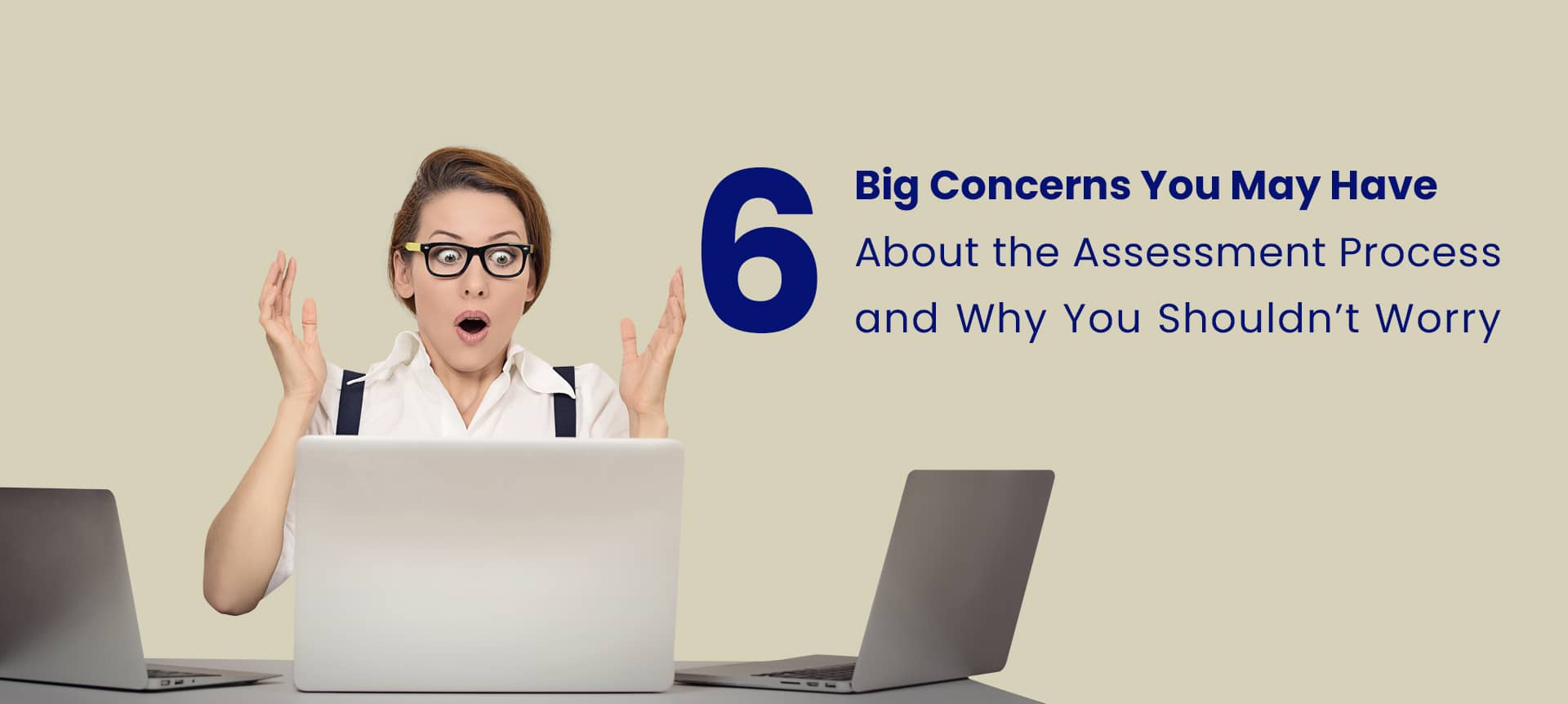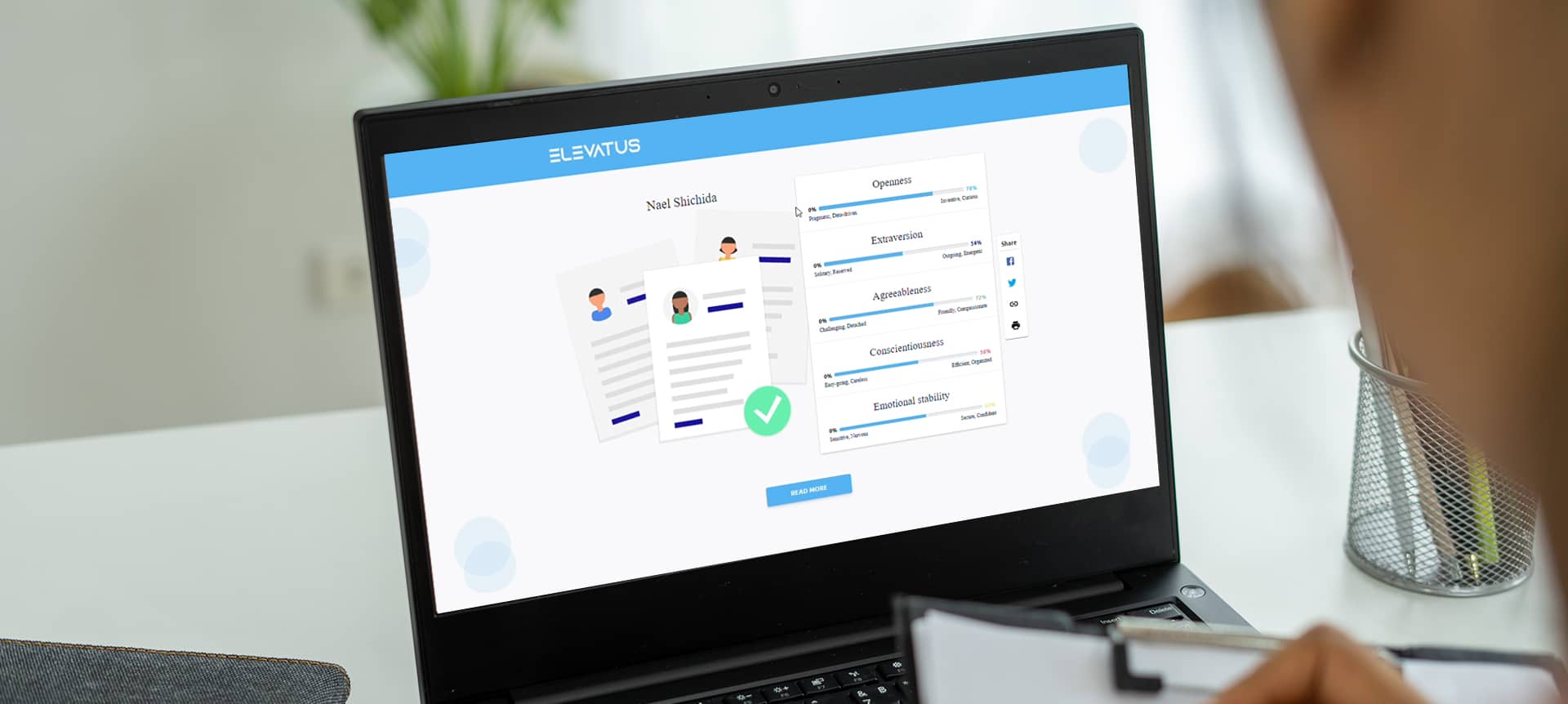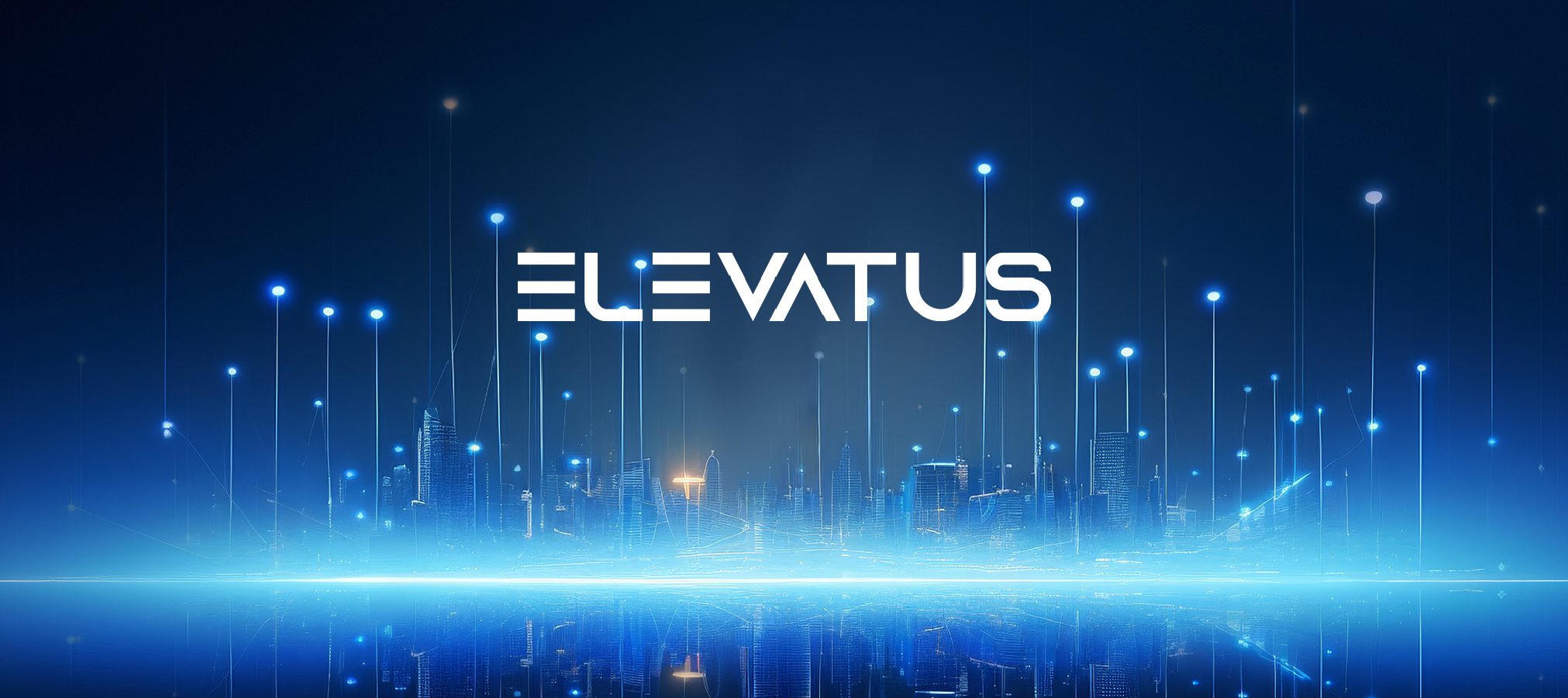
Video Interviewing Software
6 Big Concerns You May Have About the Assessment Process and Why You Shouldn’t Worry
May 19, 2023



Tima Rassool
Content Writer


Remember how we used to hate sitting for exams back in school? In the same way, the assessment process can be quite intimidating for many applicants.
Applicants have spoken out their concerns today. From the scary evaluation process, the desperate desire to impress, the fear of not answering the right way, to the tension that arises a few minutes before the assessment starts.
While getting assessed, interviewed, or evaluated induces some sort of anxiety and stress, the assessment process isn’t as scary as it may seem. Especially if you’re conducting a video assessment interview.
To keep your worries at bay, we’re going to go over a few concerns you may have about the assessment process, and why you shouldn’t worry about them!
First concern: It makes you worry about creating a lasting first impression


We all desire to create an awesome first impression prior to an interview or assessment. In fact, we all want to impress the recruiter, interviewer, or assessor. We dress up for the part, we practice in front of the mirror, we focus on our hand gestures, and we show up pretty early to the place.
But what happens when your assessment process gets shifted online, and you have to take a video assessment interview? You start to worry that you won’t be able to create a lasting first impression when you’re not physically there.
In reality, video interviewing software are actually designed to help applicants unleash their full potential and elicit a less biased first impression. This is done by helping assessors learn more about the applicant’s cognitive, behavioral and soft skills through personality reports. Also, these skills are usually hard to unravel from resumes or applications alone.
With video interviewing software, companies can get a holistic view of applicants by using personality tests to unravel the applicant’s learning and communication style, programming aptitude, ability to work in sales and more.
Which means, that even if you missed out on sharing certain expertise with the assessor, a video assessment interview gives you a chance to showcase all your capabilities, and reduce your chances of creating a bad first impression.
Second concern: Assessments are lengthy and time consuming


Many applicants seem to believe that assessments prolong the already “lengthy’’ assessment process. Which is a common gripe among applicants. They’ve got to spend endless hours crafting a solid resume only to have to re-enter the information all over again for the assessment.
Fair enough.
However, if you’re conducting your assessment with a video interviewing software like EVA-SSESS, your assessment process will be faster than you can imagine. To start off with, video interviewing software automates the pesky task of filling up your data manually.
It optimizes and automates the process of communication, gives you self-scheduling options, and one way interviews can actually shorten the assessment process for you.
You save time on commuting, you save time on manually typing or writing your answers, and most of all, you save time by choosing the time and place to take the assessment. With so much flexibility at hand, the assessment process actually becomes much shorter and more efficient for you.
Third concern: Other parts of the evaluation process are disregarded


From the application, cover letter, resume, or reference check – you might think that you have plenty of information that can help the assessor evaluate you thoroughly. Therefore, you might think that adding assessments, will only complicate things further.
However, each step of the assessment process is designed to understand various parts of the applicant’s eligibility. Your application or resume may help you create an initial first impression of you, however, there are many other gaps that still need to be filled.
For example, it’s relatively hard to discern whether an applicant is fit or not from a piece of paper alone. It’s also a bit tricky to know if their accomplishments are exaggerated on their applications or resumes. Therefore, a video assessment interview can help assessors completely eliminate the notion of unfairly assessing applicants.
AI video interviewing software can thoroughly assess applicants by taking into account the keywords they used in their video responses, and whether or not their answers are similar to your model answer. By generating a relevancy percentage for each question, applicants will be fairly assessed and evaluated throughout the entire assessment process. Without the need to rely on any guesswork!
Fourth concern: Personality-based assessments can be biased


Many applicants perceive that personality assessments promote biased assessment decisions. For example, many believe that it might make decision makers favorably prefer extroverted applicants who put themselves “out there”, over introverts who might be just as qualified but choose to solely focus on their work.
The reality is quite different though.
Companies only use personality assessments to gain further insights on the applicant, rather than make a decision purely based on their personality traits. For example, an applicant might have appeared shy and reserved during the interview process, but the personality assessment might prove otherwise.
This will prevent companies from making an unfair judgement on the applicant. So a personality assessment might find an introverted applicant to be more qualified than an extroverted applicant who amazed the interviewer in the interview phase.
Fifth concern: Assessments cause anxiety and won’t elicit honest answers


Applicants who are about to sit for an assessment, are more inclined to fake their answers just to create a great first impression. They might find themselves under pressure and somewhat forced to give the ‘’right’’ answers to further boost their chances of standing out during the assessment process.
However, a video assessment interview is not a ‘’test’’. There’s no right or wrong answer. Companies are leveraging video interviewing software to help get a deeper understanding of applicants, regardless of whether or not their answers match their ideal answers to the dot.
They mainly like to see as well if the applicants can thrive in their culture, how they like to be managed, what communication style they prefer, and whether they have the right amount of motivation to succeed in the role. Assessors want applicants to feel relaxed, this is why video assessment interviews allow applicants to take the assessments at any time or place that suits their convenience, to therefore reduce their anxiety levels.
Sixth concern: Personality assessments don’t have much to do with the job


When it comes to personality assessments, some applicants see them as an invasion of privacy or quite irrelevant to the job role. Why should personality traits play a role in determining success?
The answer is quite simple.
Learning more about the applicant’s personality traits can help companies develop better teams and setup leadership styles that are tailored to specific personalities. This leads to a much better onboarding process and management structures.
What’s more, our AI video interviewing software generates a The Five Factor Model personality report for each applicant. This helps businesses determine an applicant’s potential, job performance, and multiple dimensions of their personality. For instance, some traits may be more relevant than others when predicting job performance.
When businesses are assessing their sales team performance with our video interviewing software, they can pay special attention to how the applicants score on the personality trait ‘’agreeableness’’. The lower the score the better, because sales representatives with low agreeableness scores lack the required closing abilities.
The verdict
In the end, when done properly, the assessment process can ease applicants from all their worries and concerns. Using AI video software can help make applicants see, feel, and reap the benefits of the assessment process. Using video assessment interviews improve the applicant’s chances of shining in the assessment process and help assessors instantly identity top performers with scientifically validated assessment methods and tools.
Turn top talent to employees fast
Hire, assess, onboard and manage top talent for every job. See how Elevatus streamlines everything; from acquire to new hire.
Request a demoAuthor



Tima Rassool
A wordsmith, storyteller, and content strategist – Tima is an MBA graduate with 6+ years of experience in the world of HR. With over 2,000 blogs under her belt, Tima's expertise and insights have helped businesses across the globe take their recruitment to the next level and stay ahead of the curve.
Don't miss a thing!
Stay one step ahead. Subscribe and get the latest updates, news, and insights from Elevatus straight to your inbox.







